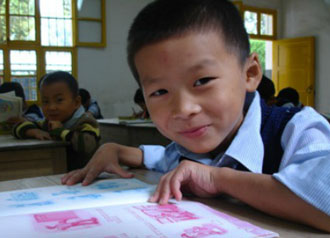A growing number of parents in China see home schooling as a way to avoid the problems they associate with sending their kids to public schools.
About 18,000 parents in China are either considering or engaged in home schooling, according to the 21st Century Education Research Institute. Over half turn to home schooling due to dissatisfaction with the educational philosophy of schools.
Not surprisingly, many parents who opt to school their kids at home are graduates of elite schools. Their educational levels combined with the ability to devote the time it takes to provide instruction to their children appear to be key elements in the decision to home school.
One example is Leng Shan, a graduate of prestigious Peking University, who had quit his job several years ago to teach his eight-year-old son. He wrote the required proposal detailing his instruction plan, which includes teaching English, French, German and math. When he isn’t teaching, Leng provides freelance translating services while also playing the role of the family’s primary homemaker.
“It’s really competitive to get into the best schools in Beijing, but home schooling can save lots of trouble, and you need not to worry about your children’s safety either,” Leng told Want China Times. He plans to home school his son until he enters college.
Home schooling is most popular in the more advanced and prosperous regions of coastal China like Zhejiang and Guangdong, as well as Beijing and Shanghai. These regions have more parents equipped with the educational and cultural attainments to question the value of conventional educations.
One example is a father who believes that immersing his child in the classics like the Analects of Confucius is the best way to impart life’s deepest lessons.
Still others see themselves as uniquely equipped to recreate in China the kinds of small, elite foreign schools they admire.
“I hope my home school will become China’s Eton to foster talent with the integration of virtue, culture and courage,” said a Beijing father named Zhang Qiaofeng who has opened up his home school to up to eight students. He teaches math and English using German and American texts.
Parents who home school their children face the usual criticism that they may be hindering their children’s social development by depriving them of peer interaction. They seek to address that concern by making a point of taking their children out to participate in community activities.
In the absence of laws setting standards for home schooling, each parent who undertakes to provide a unique education for his child is, in essence, conducting a social experiment. Such experiments may lead to insights for improving conventional schools or show that good schooling is much more than the imparting of knowledge.
In China home schooling is just emerging as a new phenomenon, but in the US it has been surging in popularity. Since 1999 the number of children schooled at home has jumped 75%. That’s seven times the rate of growth of the enrollment in conventional schools. Today 4% of all school-age kids in the US — or about 3 million — are home schooled.


